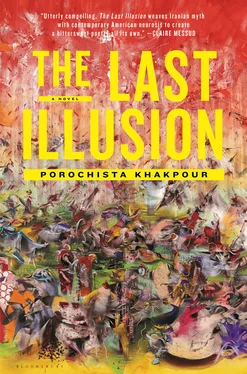On such a day, a very hot day, when they were lazily lounging to escape the relentless heat, watching TV in Asiya’s central-air-conditioned townhouse for once, she suddenly let out a gasp.
Zal didn’t turn from the paper. She was watching the news, something that never interested him much. “Hmmm?”
“Zal, it’s your magician! Hurry!”
Zal turned to look. Indeed, it was Bran Silber, in those ridiculous silver overalls he loved to wear at the Silbertorium, gesticulating wildly about something. “Oh, God. What is it now?”
“His new stunt!” Asiya’s voice sounded uncharacteristically excited.
And then he saw why. The program flipped to footage of the World Trade Center, gleaming in the summer sunlight, then back to Silber still gesticulating, hands webbed widely as if to say WHOOSH!
Zal was curious. “Turn it up, Asiya.”
Silber was saying, “You know, it was like a dream or something. It just came to me at the end of 1999, right in the whole Y2K thing! I was doing this whole Flight Triptych bit”—cut to footage from the finale of the Triptych, socialite in arm, flying through the New York auditorium, a painful sight still for Zal—“and then I thought, I want to do something totally different, but that’s still me, you know? Something so different that it’s like the opposite! And then it was like, uh-oh, spaghetti-o, sister, here we go! It’s the biggest one yet. Just so much bigger than me, so much bigger than any of it, ever.”
The news anchor, smiling and nodding frantically, asked, “Any worries about pulling it off?”
“Usually I say no — Bran Silber is Mr. Cool-as-a-Cucumber-oso, right? But I have to be honest: I’m worried. My whole staff is worried. This one is a bit of a killer. I’m keeping my fingers crossed — my everything crossed, to be honest.”
And for a moment the fluorescent-white smile was gone. Zal thought he saw actual wrinkles on Silber’s forehead. And, as if his moment of pensiveness was too much for the anchor, the interview was cut short and it was back to the news desk.
“Zal, isn’t that crazy? He’s making the World Trade disappear in just a few weeks! Can you believe it?”
Zal shrugged. “Yeah, I guess we were just there recently.” He saw what was coming and refused to go where she was going with this.
“This is it,” she said. “My God, this is it. Maybe there’s hope. Maybe we don’t have to move by then. .”
He raised an eyebrow. He had forgotten about her desire to move before the disaster hit.
“He can help. I know it! Maybe he already is helping. Zal, your friend can maybe make this all right again!”
He shook his head. “He’s not my friend. I just knew him at one point, but actually we kind of fell out many months ago.” Still, he was relieved something was giving her hope.
She shook her head right back at him. “I know what I have to do. I’m going to write it all down. Then just do me one tiny favor, Zal, because you love me and because I love you and because it’s almost over and really and truly we might have a chance at living through this and being happy—”
“Asiya — what?” he asked wearily.
“I want to write it down and have you give it to him.”
Zal sighed. “Write what? Never mind, but I’ll read it first, of course.”
She nodded. “Of course. But just give it to him.”
He nodded slowly. What did he care. He wasn’t the one sending him a letter; it was her. He had nothing to do with it. If that alone was going to give her something to live for, then why not? Who was he to rob her of any hope, even if it was hope that involved the bullshit arts and its master of nothing but dead tricks? Even if it was the most hollow kind of hope?
With relief, with humiliation, with terror, he understood that he also was an illusion, that someone else was dreaming him.
— Jorge Luis Borges, “The Circular Ruins”
Augusts were always bad, he thought, and he couldn’t quite remember what Septembers were like, only that August felt endless and relentless, uniform and merciless, all one killer weather, all orange and black, all sweat and salt, and fire and mirage — so one could only assume the same for September, or at least the part of it that claimed to be related to summer. But in August he gave up hope the way he did in February, when everything turned white and freezing and indifferent. August was burning and overzealous, and there was no room in either of those months to count on anything. They were exhausted by everything all over again — too exhausted to eat, to sleep, to have sex, to talk, to fight, to think, to imagine, to dream. The world felt unquiet, but in a familiar way.
One day, Hendricks knocked on his door. He knew it by the knock — who else wouldn’t have to buzz? Without asking, Asiya rolled her eyes and retreated to the bathroom — what she had done the other two times he had visited in the time she had been back with Zal, who was still not ready to reintroduce that element to their relationship, and still not ready to trust Hendricks with Asiya in that most fragile state, further than ever, it seemed, from health.
Zal had been lying on the couch, snacking idly, pretending to read a magazine but overwhelmed by the ninety-degree heat all the air in the world couldn’t make up for. A jar of yogurt-covered beetles lay innocently on its side atop the coffee table — evidence he had always remembered to hide before his father visited.
Hendricks had immediately, after his routine bear hug, taken a seat on the couch, not even registering Zal’s usual antsiness with Asiya in the bathroom.
“It’s just relentless, isn’t it?” he was saying. “I understand why so much of the city gets out in August. I’ve had I-don’t-know-how-many Augusts here, and it still gets me every time. Anyway, how are you, my boy?”
Zal shrugged and nodded at the same time and sat on the floor. Suddenly his eye fell on the jar. He felt a beehive tip over inside him. There was nothing he could do now: reach out for it and Hendricks would notice; move him away from the table and Hendricks would notice; say anything, nothing, and Hendricks would notice.
“I’m doing really, really, really well,” Zal stammered, his eyes glued to Hendricks’s, which were already on the table and quite possibly right on target.
For a moment, everything was still. The air conditioner whirred obliviously, and Zal imagined he could hear Asiya’s quickened breaths behind the bathroom’s closed door.
Finally Hendricks leaned in and squinted a bit. He reached over and Zal nearly screamed, wondering if a seizure would be enough to distract his father. But it was too late: Hendricks’s hands were on the jar, the jar was being picked up, inspected, and, horror of horrors, unscrewed.
“Father, what are you doing?” Zal exclaimed as one of Hendricks’s fingers went in.
“What is this, pastilles of some sort? White chocolate?”
Zal shook his head, gulping furiously. “Yogurt,” he said. “Just yogurt.”
“Oh, nice,” Hendricks said, reaching in deeper.
“No! Not nice. They are quite gross!” Zal tried to grab the jar.
But Hendricks was already holding it up to his nose. “Strange smell.”
Zal nodded. “See! They are terrible!”
Hendricks smiled, amused. “Worth a try,” he said, and again he reached in.
Zal had had it. At that moment, he leapt up and karate-chopped the jar out of his father’s hands, the yogurt beetles skittering all over the floor. It was a small disaster compared with the one that had been averted, he thought.
“Zal, what on earth is the matter with you?” Hendricks began to pick them up.
Just the sight of his hands on the coated insects reminded Zal that he ingested, daily, insects. He shuddered.
Читать дальше












